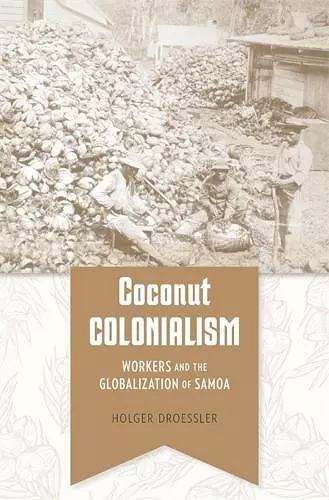Coconut Colonialism
Workers and the Globalization of Samoa
Format:Hardback
Publisher:Harvard University Press
Published:28th Jan '22
Should be back in stock very soon

A new history of globalization and empire at the crossroads of the Pacific.
Located halfway between Hawai‘i and Australia, the islands of Samoa have long been a center of Oceanian cultural and economic exchange. Accustomed to exercising agency in trade and diplomacy, Samoans found themselves enmeshed in a new form of globalization after missionaries and traders arrived in the middle of the nineteenth century. As the great powers of Europe and America competed to bring Samoa into their orbits, Germany and the United States eventually agreed to divide the islands for their burgeoning colonial holdings.
In Coconut Colonialism, Holger Droessler examines the Samoan response through the lives of its workers. Ordinary Samoans—some on large plantations, others on their own small holdings—picked and processed coconuts and cocoa, tapped rubber trees, and built roads and ports that brought cash crops to Europe and North America. At the same time, Samoans redefined their own way of being in the world—what Droessler terms “Oceanian globality”—to challenge German and American visions of a global economy that in fact served only the needs of Western capitalism. Through cooperative farming, Samoans contested the exploitative wage-labor system introduced by colonial powers. The islanders also participated in ethnographic shows around the world, turning them into diplomatic missions and making friends with fellow colonized peoples. Samoans thereby found ways to press their own agendas and regain a degree of independence. Based on research in multiple languages and countries, Coconut Colonialism offers new insights into the global history of labor and empire at the dawn of the twentieth century.
This is a significant and provocative book that is essential reading for anyone interested in colonialism in the South Pacific. -- Paul Shankman * Pacific Affairs *
Coconut Colonialism is a brilliant new work that captures a confluence of histories centered on the critical German colony of Samoa. It interrogates the globalizing moment brought by colonialism and capitalism, and laid bare in its encounters with indigenous Samoa. It is a global moment seized not only by colonial agents and commercial enterprise but contested by those they sought to dominate and exploit. Threaded with an angle of vision that centers Samoa’s colonized, its workers and subjects, Coconut Colonialism offers powerful new insights into both the local and global natures of colonialism. Coconut Colonialism is a critical contribution to our understanding and knowledge of Samoa, of German colonialism in particular and of the practices of colonialism writ more broadly. -- Damon Salesa, author of Island Time: New Zealand’s Pacific Futures
Based on thorough and extensive research across multiple empires and regions, Droessler provides a strong history of the impacts of colonization and actions of native peoples, as well as histories of capitalism and labor in the Samoan region from the late nineteenth century through the end of World War II. This book is a great addition to the much needed scholarship on the Samoan region and the global influence of its people. -- Joanna Poblete, author of Balancing the Tides: Marine Practices in American Sāmoa
Coconut Colonialism makes for fascinating reading on a much-neglected part of the German and US empires, the Pacific islands of Samoa. Richly documented, this study foregrounds the perspective of Samoan workers whose strategies of accommodation, and of resistance, come fully alive. An important contribution to the literature on colonialism and capitalism. -- Sebastian Conrad, Freie Universität Berlin
ISBN: 9780674263338
Dimensions: unknown
Weight: unknown
304 pages